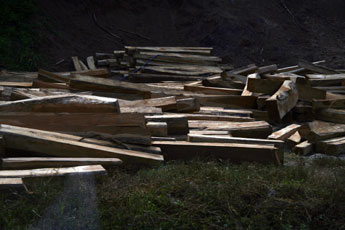Papua New Guinea’s forests under threat from corruption, illegal logging
Rhett A. Butler, mongabay.com
March 8, 2006
Illegal logging is destroying large areas of rainforest in Papua New Guinea according to a report released last week by Forest Trends, a leading international forestry organization.
The 5-year survey, Logging, Legality, and Livelihoods in Papua New Guinea, found foreign timber firms—predominantly Malaysian—flaunt existing forestry laws thanks to widespread corruption. Papua New Guinea is consistently rated as one of the world’s most corrupt countries by Transparency International.
“While the PNG government and its regulatory institutions have all the necessary policies, laws and regulations to ensure that sustainable timber production can be achieved, these laws are not being enforced,” Forest Trends said in a statement.
“Industry is allowed to ignore PNG laws and, in fact, gains preferential treatment in many cases, while the rural poor are left to suffer the social and environmental consequences of an industry that operates largely outside the regulatory system.”
“Corruption has a devastating effect on the living standards in the area as well as the long-term benefits for landowners,” said Kerstin Canby, Forest Trend’s Program Manager for Finance and Trade. “Basic rights of the landowners are being ignored—even abused. There are a few logging operations in the country which are deemed beneficial to both local landowners and the country, but they are lost in a sea of bad operators. The government needs to support these companies, or risks having the international community boycott all of PNG’s exports.”
Forest Trends said that Papua New Guinea’s forest industry is predominately focused on the harvesting of natural forest areas for raw logs exported to markets in China, Japan, and Korea. Many of the logs are processed in China for consumption in Europe and North America.
In its review of fourteen logging projects covering an area of 3.17 million hectares, Forest Trends found that forests were not being managed to maintain a sustained yield of timber and all fourteen projects were operating unlawfully.

|
According to the report, logging is having a negative social impact and is failing to contribute to the long-term economic success of most Papuans.
“While logging in Papua New Guinea is bringing short-term cash incomes to local resource owners, these are quickly dissipated and, in general, have not delivered lasting, long-term benefits to the community, such as permanent infrastructure and other services,” Forest Trends said a release. “Employment and other spin-off’ benefits are usually taken by outside workers. Salaries and working conditions are generally very poor and have been officially described in one project as ‘modern day slavery.'”
According to the report, official forestry figures are “unreliable” and even “wildly misleading.” Thus UN data showing the country’s deforestation rate at a relatively 0.5-1 percent per year may not be accurate, even though they indicate that more than 250,000 hectares of primary forest have been lost each year since 2000. Further, because “official inspections at export only verify the quantity and description of the timber to ensure export taxes are paid” they are effectively laundering “unlawful’ timber into legitimately-produced exports accepted by governments and retailers worldwide.” Foreign buyers have no way of knowing whether timber has been legitimately harvested.
The Forest Trends report makes a series of recommendations to mitigate some of the key problems in Papua New Guinea’s forestry sector. These recommendations include: “continued monitoring of activities in the region, the establishment of a legal fund to support legal challenges through the court system, raising awareness about land-owner rights, support to the Ombudsman Commission, best-practice reviews, and international assistance to investigate potential corruption and the relationship of the timber industry to political groups.”
Forest Trends Report: Logging, Legality and Livelihoods in Papua New Guinea: Synthesis of Official Assessments of the Large-Scale Logging Industry
More information on Papua New Guinea
This article used press materials from Forest Trends







